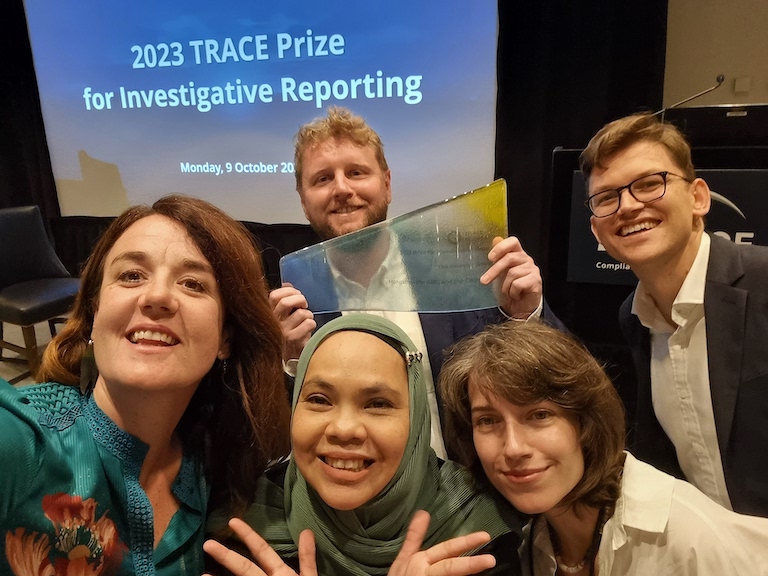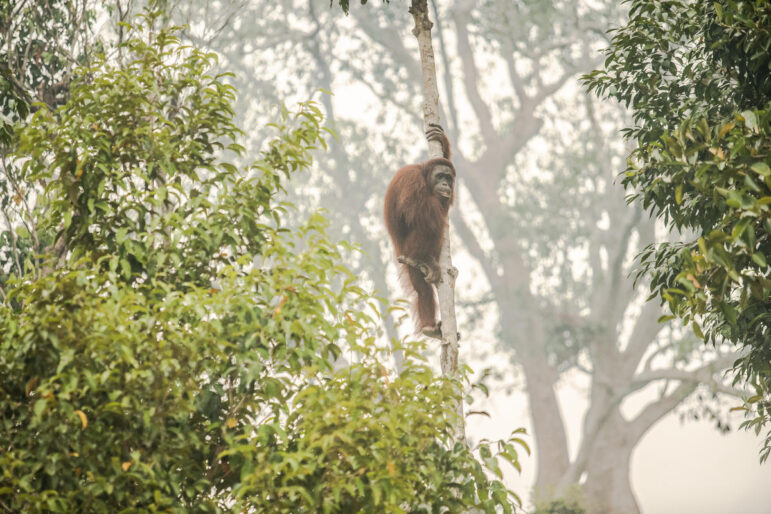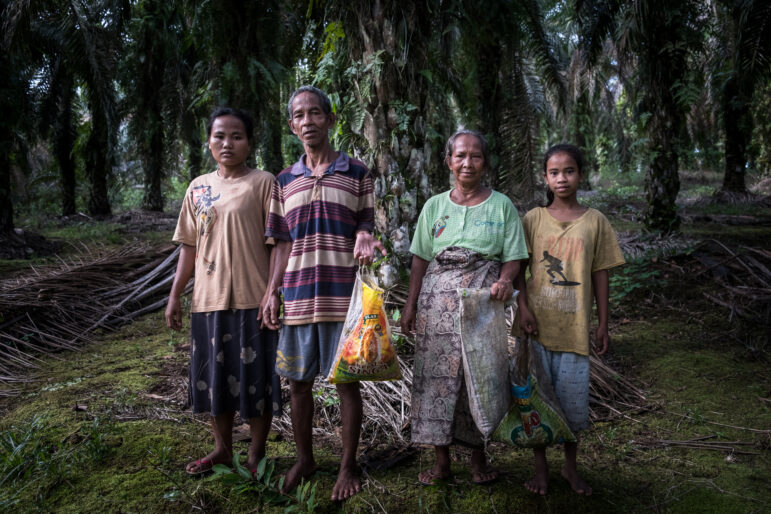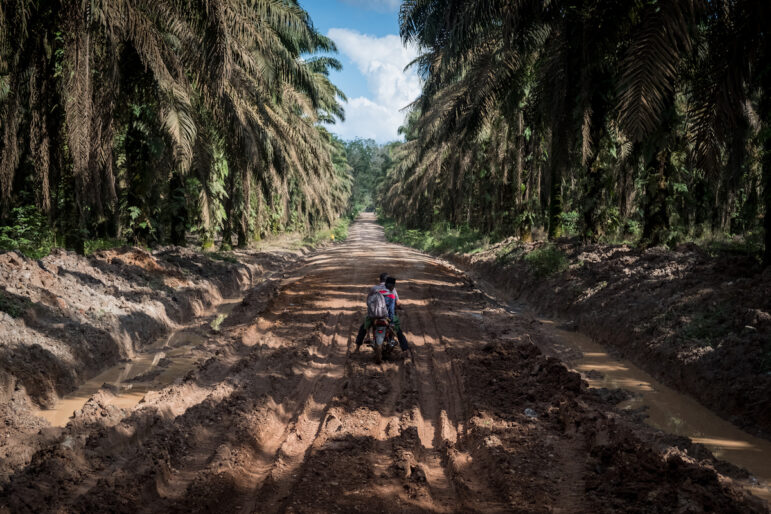
In May 2022, Mongabay published a joint investigation with The Gecko Project and BBC News. It found that Indonesian communities could be losing hundreds of millions of dollars each year due to palm oil producers’ failure to comply with regulations requiring them to share profits from their plantations with communities whose land the palms are grown on.
The regulations are part of a scheme to distribute the palm oil profits (called “plasma”) and was considered a means to reduce poverty across rural Indonesian communities. However, the palm oil companies’ unfulfilled promises to share the funding have resulted in large and long-term profit losses for villagers plus widespread unrest and protests across the country. The plantation scheme prevents smallholder farmers from using their own land. Therefore, when companies fail to share the palm oil profits made on the land, it doubles the communities’ losses.
According to our team’s research, it’s estimated that villagers in Central Kalimantan province alone could be losing more than $90 million each year in profits. Many rural communities have marched in the streets, demonstrated outside government offices, blockaded roads and occupied plantations in protest. These moments have culminated in villagers facing violence at the hands of the police, and some have been jailed.
This investigation exposed the problem of companies not sharing plasma with communities on a national scale in Indonesia. It involved collecting and analyzing data from government agencies, corporations and the media, and triangulating this with data obtained from field reporting done by our team in nine provinces across Indonesia’s three largest islands.
Impact

Greenpeace captured this image of a Bornean orangutan, an endangered species, clinging to a tree amid a forest fire in 2019. Image by Jurnasyanto Sukarno.
Since it was published, we have observed several real-world impacts due to this investigation in the form of media coverage by other news outlets, actions by key decision-makers and prestigious awards.
Multimedia coverage
The impact rippled across various media platforms following our investigation, leaving a significant mark. Notably, a 16-minute video aired on BBC World, the renowned global TV channel, and then on the BBC’s iPlayer, a popular on-demand video service. Additionally, the BBC dedicated airtime to a 30-minute documentary, presented in Indonesian with English subtitles, further amplifying the reach of the findings. Our story also took center stage on the BBC’s Newshour radio show and podcast.
Beyond video and radio, numerous news outlets recognized the significance of the investigation, leading to the publication of related articles. New Mandala published a piece highlighting how oil palm companies frequently disregard the law, leading to widespread illegality and impunity, in which our findings featured prominently.
Key decision-makers
The team’s undertaking also reached critical decision-makers, especially government officials in Indonesia. We documented 38 public statements highlighting problems with plasma and calling for action from provincial and district-level officials from 13 administrations across nine provinces, and 12 steps taken by provincial and district governments, including parliamentary ‘special committees’ to investigate plasma, and threats to revoke the licenses of companies that refused to provide plasma.
Two days after our investigation was published, Indonesia’s chief economics minister, Luhut Pandjaitan, announced an audit of the palm oil industry, which he said would examine companies’ “partnership with nearby smallholder farmers.” The timing suggests the investigation likely played a part in this decision. On June 2, the governor of Indonesia’s Central Kalimantan province, Sugianto Sabran, announced the formation of a task force to investigate whether companies were providing communities with the required plasma funds.
According to Mongabay’s senior editor for Southeast Asia, Philip Jacobson, in the wake of the investigation, Indonesian media recorded public statements from at least four provincial and eight district governments about the lack of plasma, and either commitments to do more or statements that there is a definite problem. The team also heard privately from six consumer goods firms that they are taking steps to find out if their suppliers have met plasma obligations.

Ridah, Cilin, Siti Maninah and Yenita, members of the Suku Anak Dalam, in a plantation in South Sumatra. Image by Nopri Ismi.
Just a few days after publishing the investigation, The Straits Times, a large Singapore-based news outlet, reported that the Indonesian government “will audit companies’ land size, partnership with nearby smallholder farmers, and tax reports, among others.”
The report also sparked a petition that accrued over 129,000 signatures which called on Mondelēz, one of the world’s biggest snack food companies that sources palm oil from the region, to stop buying palm oil from Golden Agri-Resources, a plantation company named in the investigation.
Our partners at The Gecko Project also informed us that a district head in Indonesia’s Central Kalimantan province has said they will do their own audit of plasma provisions. Then the Gecko Project was invited to present the investigation’s findings to Columbia University’s Executive Training on Sustainable Investments in Agriculture 2023 program, with participants including government officials from various countries including Malawi, Ghana, Brazil, Jamaica, Kenya, St. Lucia and Cameroon.
Awards and recognitions
This wide-ranging collaborative investigation was awarded the 2023 TRACE Prize for Investigative Reporting, the Society of Publishers of Asia (SOPA) gave it the Excellence in Bahasa Indonesian News Reporting Award, and it was included in the Global Investigative Journalism’s 2022 Best Investigative Stories from Southeast Asia.
“Reporting by many Mongabay-Indonesia journalists across several provinces in Sumatra and Borneo went into this project. It is nice to see it receive some recognition, highlighting an extremely underreported and little-known issue, despite all the attention placed on the palm oil industry,” said Jacobson.

[Photo: Part of the team collected the 2023 Trace Prize in London. Pictured (in front, left to right) are Rebecca Henschke of BBC and Aseanty Widaningsih Pahlevi and Alexandra Popescu of Mongabay; (back) Tom Johnson & Tom Walker of The Gecko Project.]
The Gecko Project
- Margareth Aritonang
- Tom Johnson
- Safrin La Batu
- Ian Morse
- Gilang Parahita
- Leoni Susanto
- Rio Tuasikal
- Tom Walker
Mongabay
- Ari Anggara
- Jaka Hendra Baittri
- Elviza Diana
- Philip Jacobson
- Yusie Marie
- Aseanty Pahlevi
- Yitno Suprapto
- Suryadi
- Taufik Wijaya
BBC News
- Aghnia Adzkia
- Astudestra Ajengrastri
- Rebecca Henschke
- Muhammad Irham
- Haryo Wirawan
Independent
- Eko Nurcahyono
- Sarjan Lahay
- Boris Pasaribu
- Fathur Rahman
- Petrus Suwito
- Masrani Tran
- Thibi
Designers
- Davies Surya
- Arvin Supriyadi
Conclusion

Muddy, rutted roads such as this one, on a London Sumatra plantation in Bina Karya village, are common on oil palm plantations. Image by Nopri Ismi.
The joint investigation by Mongabay, The Gecko Project and BBC News exposed a widespread issue of injustice that’s seemingly prevalent across Indonesia’s palm oil industry. The national and international coverage, extensive official acknowledgments and consequent governmental actions attest to its influence. While its long-lasting impact is yet to be fully realized, pursuing truth and accountability has created momentum toward a more equitable and sustainable palm oil sector.
Support independent environmental journalism
If you are interested in helping sustain independent news, there are two excellent ways you can do so with Mongabay. First, consider making a donation, which directly helps us continue to produce high-impact journalism from Nature’s frontline. Second, subscribe to Mongabay’s newsletter to get the latest environmental news delivered right to your inbox.
About Mongabay
Mongabay is a nonprofit environmental science and conservation news platform focused on providing cutting-edge independent journalism from Nature’s frontline. We pride ourselves on producing reporting that has substantial, tangible impacts around the world.